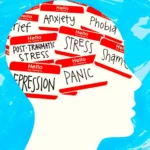Mental Health Stigma in Africa: Changing the Conversation

Mental health is an essential part of overall wellbeing, yet across much of Africa, it remains a subject shrouded in stigma, silence, and misunderstanding. Despite progress in recent years, many Africans still face barriers when it comes to acknowledging mental health challenges or seeking professional help. Depression, anxiety, and stress-related illnesses are rising, but cultural beliefs, lack of resources, and societal pressures often prevent open conversations. To create healthier communities, Africa must shift the narrative around mental health.
The Reality of Mental Health in Africa
According to the World Health Organization (WHO), nearly 116 million people in Africa were living with depression in 2019, and this number has only grown since the COVID-19 pandemic. Yet, the continent has some of the lowest mental health resources in the world—with fewer than one psychiatrist for every 500,000 people in many countries.
Despite the growing need, stigma continues to silence people. Mental illness is often seen as a sign of weakness, a spiritual attack, or even a curse. These misconceptions discourage individuals from seeking care, forcing many to suffer in silence.
Roots of Mental Health Stigma
-
Cultural Beliefs – In many African societies, mental illness is explained through spiritual or supernatural causes, rather than medical conditions.
-
Social Pressure – Families often discourage open discussions, fearing judgment or shame from the community.
-
Lack of Awareness – Limited public education means many people cannot recognize symptoms of mental health challenges.
-
Scarcity of Resources – Even when individuals want help, services may be inaccessible or unaffordable.
The Impact of Silence
Stigma has devastating consequences. People living with depression or anxiety may avoid seeking treatment until their condition becomes severe. Young people, in particular, struggle with balancing modern pressures—academic, financial, and social—without safe spaces to talk about mental health. This silence can lead to substance abuse, broken relationships, and in extreme cases, suicide.
Breaking the Stigma: Changing the Conversation
While the challenges are real, Africa is also witnessing a positive shift. Governments, NGOs, health workers, and even celebrities are stepping forward to normalize mental health conversations. Here are some ways the narrative is changing:
1. Education and Awareness Campaigns
Countries like Nigeria, Kenya, and South Africa are seeing more awareness campaigns in schools, churches, and media. These efforts teach people that depression, anxiety, and trauma are medical conditions—not curses or personal failings.
2. Role of Faith Leaders
Faith is central to African life, and religious leaders have enormous influence. When pastors, imams, and traditional healers encourage compassion and openness, they help dismantle harmful stereotypes.
3. Youth-Led Advocacy
Young Africans are using social media to share their experiences with mental health, creating online communities where others feel less alone. Platforms like Twitter and TikTok have become safe spaces to normalize therapy and emotional vulnerability.
4. Workplace Wellness Programs
More African companies are introducing wellness initiatives, offering counseling hotlines, stress management workshops, and mental health days. This recognition helps reduce stigma in professional spaces.
5. Policy and Investment
Several African governments are beginning to integrate mental health into primary healthcare. Though progress is slow, increased funding and training for health workers are essential steps.
Practical Steps for Individuals and Communities
-
Talk Openly: Share personal experiences with trusted friends or family.
-
Seek Professional Help: Use local health centers or online therapy platforms when available.
-
Challenge Negative Beliefs: Correct myths when you hear them in conversations.
-
Support Others: Show empathy when someone expresses stress, sadness, or anxiety.
-
Promote Self-Care: Encourage healthy practices like rest, exercise, and mindfulness.
A Call for Collective Action
Changing the mental health narrative in Africa is not the responsibility of one group—it requires collaboration. Governments must increase investment in healthcare, communities must foster openness, and individuals must challenge stigma in everyday conversations. By bringing mental health into the open, Africa can build stronger, healthier societies.
Final Thoughts
Mental health is just as important as physical health, and silence only deepens suffering. By changing the conversation, Africans can break down stigma, offer compassion, and create systems that support healing and resilience. The future of Africa depends not only on physical wellness but also on nurturing minds and hearts.
Written by Fawzi Rufai, Medically Reviewed by Sesan Kareem



